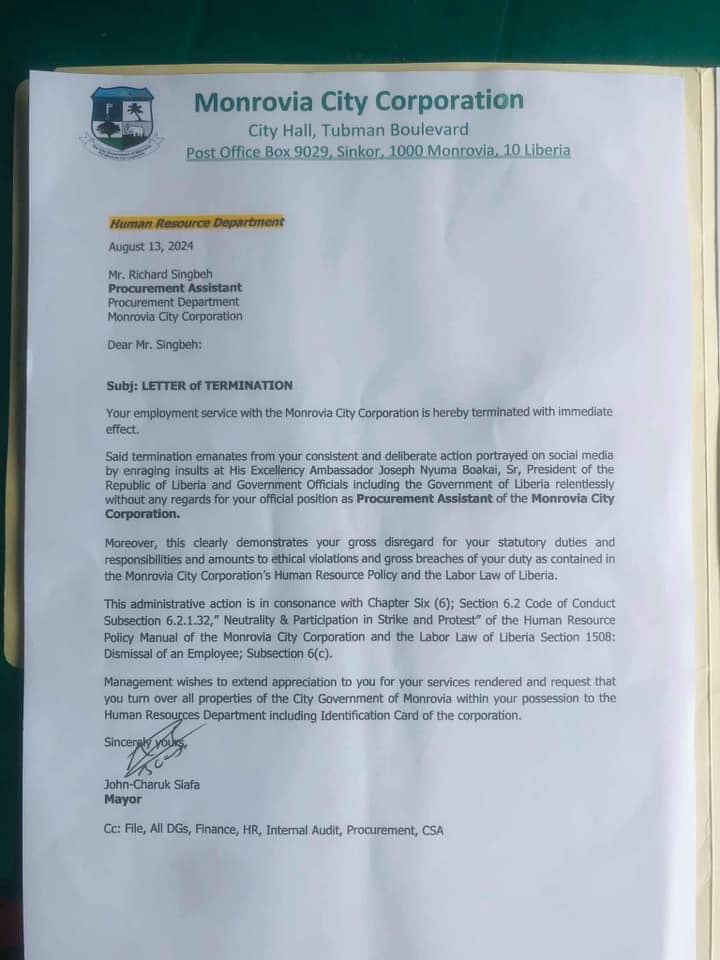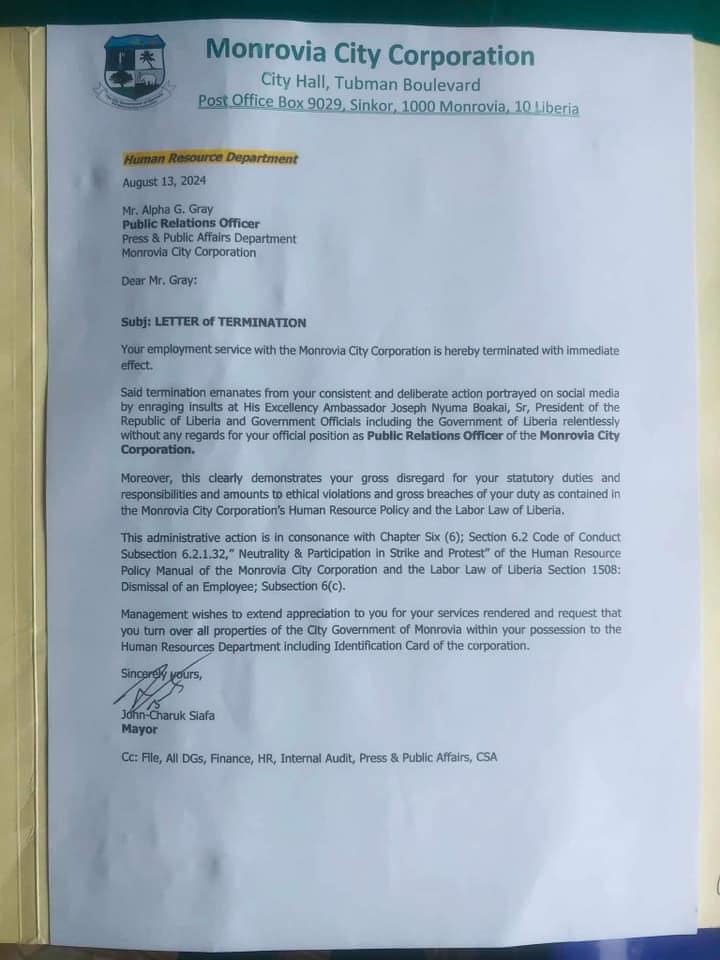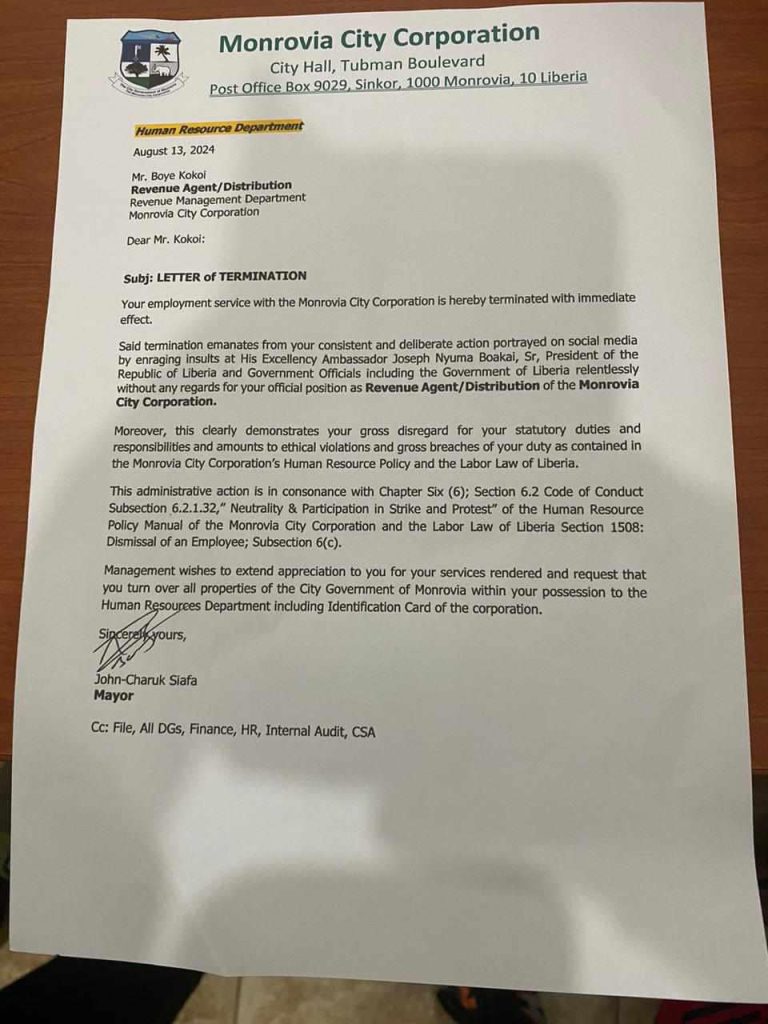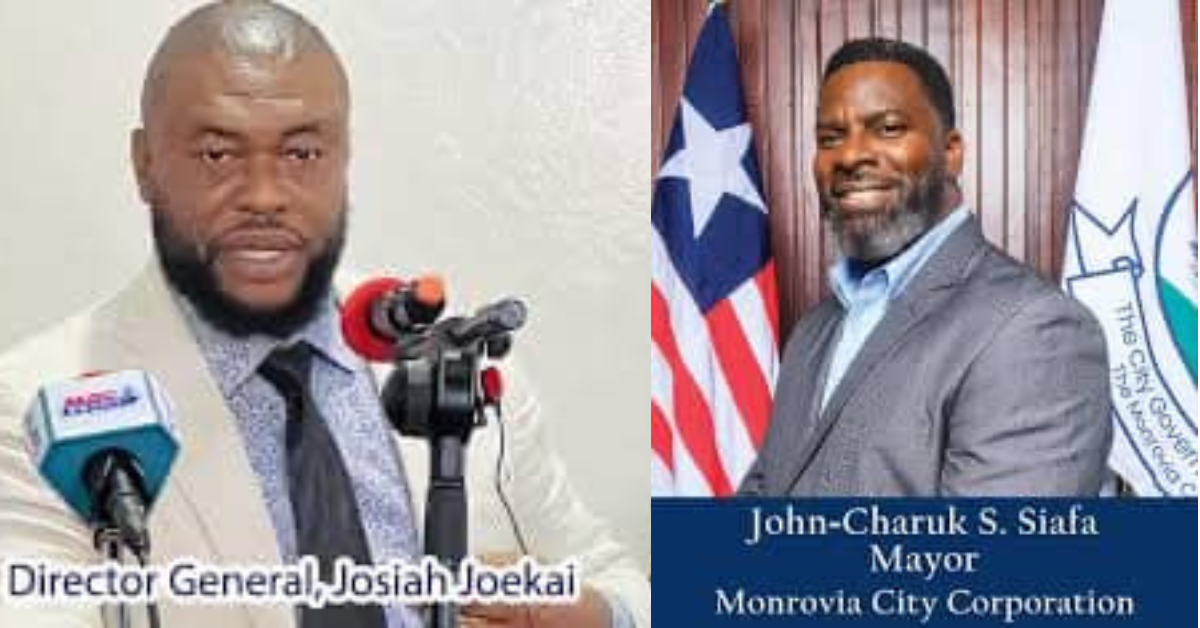Monrovia, Liberia – In a move that has sparked widespread debate and concern among civil society groups and legal experts, Monrovia City Mayor Mr. John-Charuk Siafa has dismissed several Monrovia City Corporation (MCC) employees. The dismissals came following a verbal recommendation from Liberia’s Civil Service Agency (CSA) Director General Josiah Joekai, who accused the employees of using social media platforms to insult President Joseph N. Boakai and other government officials. The dismissal letters issued by Mayor Siafa cited Section 6.2 of the National Code of Conduct as the basis for the action.
The National Code of Conduct for Public Officials and Employees of the Government of Liberia, as established by the Act of the Legislature, outlines specific guidelines and standards for the behavior of government employees. Section 6.2, in particular, addresses the use of public office for personal gain and the importance of maintaining a positive image of government officials. However, critics argue that the immediate dismissal of the MCC employees without proper investigation or due process raises questions about the legality of the Mayor’s actions.



According to the Code of Conduct, the Office of the Ombudsman is responsible for investigating alleged violations of the code. The Ombudsman is tasked with ensuring that all allegations are thoroughly examined and that accused individuals are given a fair hearing. By bypassing this established process, Mayor Siafa’s actions could be seen as a violation of Section 11.21 of the Code, which emphasizes the need for due process and the rights of the accused to defend themselves against allegations.
Legal experts suggest that a more appropriate course of action would have been to refer the matter to the Office of the Ombudsman for a formal investigation. This would have ensured that the rights of the accused employees were protected and that any disciplinary measures were based on a thorough and impartial review of the evidence. In this case, due process would have involved notifying the employees of the allegations against them, providing them with an opportunity to respond, and conducting a fair and transparent investigation into the matter.
On August 7, 2024, President Joseph N. Boakai commissioned the new Ombudsman for Liberia, marking a significant step towards strengthening governance and accountability in the country. This role is now held by the esteemed Cllr. Findley Karnga, a distinguished Liberian barrister renowned for his contributions to the legal profession.
A good start is the appointment of Cllr. Karnga, which was met with optimism from civil society groups like the Center for Transparency and Accountability in Liberia (CENTAL). They believe this move represents a milestone in Liberia’s fight against corruption, a sentiment echoed during a recent statement from CENTAL’s Executive Director, Anderson Miamen. He highlighted the critical role of the Ombudsman’s office in enforcing the Code of Conduct and ensuring that public officials adhere to ethical standards. Despite the positive reception, there have been concerns about this government’s failure to comply with the rule of law in many separate issues such as the violation of tenure law regarding wrongful dismissals across government ministries and agencies.
The creation of the Ombudsman’s Office fulfills a constitutional mandate and aligns with the broader goals of promoting justice, integrity, and fairness within Liberia’s public sector. With Cllr. Karnga at the helm, the office is expected to investigate and address complaints against government agencies, thus fostering a culture of accountability. This initiative, when fully implemented, will not only demonstrate President Boakai’s commitment to reinforcing public trust and confidence but could also prevent such actions by Mayor Siafa.
To resolve this issue peacefully and ensure adherence to the rule of law, it is recommended that the MCC and the CSA work together to review the dismissals and consider reinstating the employees pending a proper investigation. The Office of the Ombudsman should be involved in this process to provide oversight and ensure that all parties are treated fairly. Additionally, the government could consider implementing training programs to educate public employees on the appropriate use of social media and the importance of upholding the dignity of their office. By taking these steps, the government can uphold the principles of justice and accountability while fostering a respectful and constructive dialogue among its employees.

Dr. Clarence R. Pearson, Sr. is a Liberian clergy and social scientist with strong interest in advancing global peace, human rights, a safe planet, and social equity. He holds a BA in Theology, and MA with distinction from the Kofi Annan Institute for Conflict Transformation, University of Liberia. He also graduated with honor from the Louisiana Baptist University and Seminary, Shreveport, Louisiana, USA with A PhD in Psychology and Counseling. Dr. Pearson is a social researcher, an educator, and an author. He has over 29 years of practical professional experience in post-conflict peace-building, recovery, and development with emphasis in both the public and private sector.

